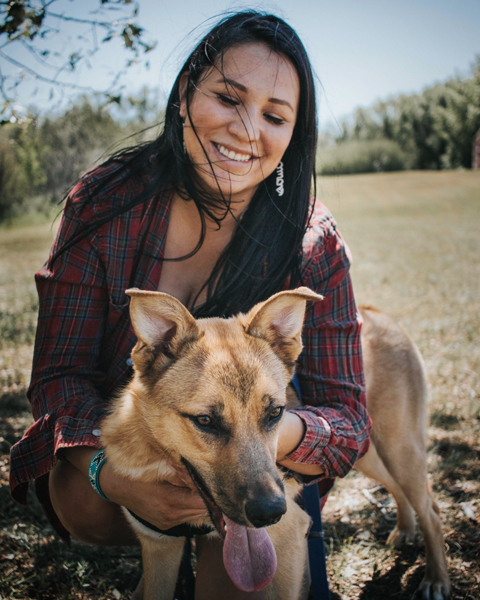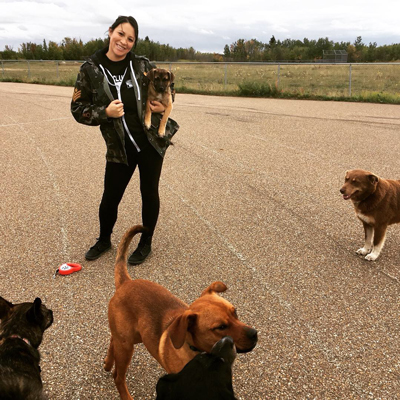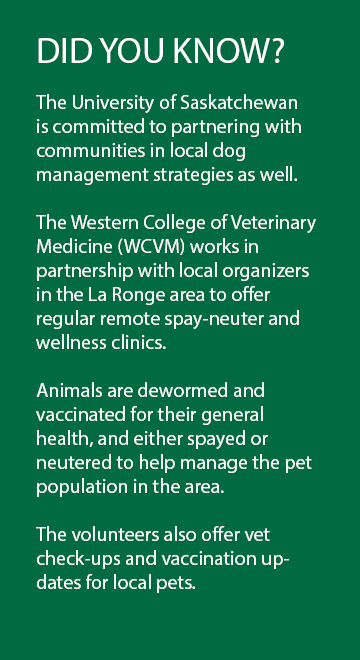
Lending a hand to her canine companions
Leah Arcand works tirelessly to advocate for free-roaming dogs.
By Leslie-Ann SchlosserLocated roughly 100 kilometers northwest of North Battleford, Thunderchild First Nation, also known as kahptikonahk or Piyesiw-Awasis, is an independent Cree Nation home to 630 people.
It’s also the place that ignited Leah Arcand’s (BEd’14) love for helping free-roaming dogs.
The University of Saskatchewan (USask) alumna grew a deep aspiration for teaching at both the College of Education and through the USask ITEP program. Arcand moved to the Thunderchild First Nation in 2016, when she relocated to teach a land-based education program to Grade 7-8 students.
Little did she know the move would ultimately lead her to discover a passion she never knew existed.

Her mission began after she adopted her first dog and fostered several others. One dog in particular, Smeagles, a pup that roamed around the school where she taught every day, became so near and dear to Arcand that it is difficult for her to talk about her without getting emotional.
“[She] was my protector, [she] was my companion,” recalls Arcand.
A frequent acquaintance, Smeagles often accompanied Arcand to her home on the reserve. As their relationship grew, Arcand saw how difficult it was for Smeagles to roam freely when she was in heat, because she was not spayed. Smeagles eventually got pregnant and gave birth to nine puppies. Arcand took it upon herself to act as Smeagles’ midwife and make sure each of the puppies went to a safe home. She charged a fee for each puppy and raised the funds needed to get Smeagles spayed.
Today, Smeagles is happy and healthy. She can now roam freely without living in anxiety. She has a family and still hangs around the school, where the maintenance worker takes weekly photos and sends them to Arcand.
While Smeagles is a success story, her situation shed light on a deeper issue for Arcand. She became keenly aware that Smeagles’ positive outcome isn’t always the case for many other free-roaming dogs living on reservations.
“There are so many Smeagles,” said Arcand. “I became aware that these animals are the most vulnerable members in our communities. I really wanted to help them all.”
A way to help
According to Arcand, dogs on reservations in Saskatchewan are primarily free-roaming or strays. If they are not spayed or neutered, this results in an influx of dogs in the community.
If dogs do have owners, they often don’t have the resources needed to maintain an overpopulation. This results in a large number of dogs that are left unattended to roam and fend for themselves among other wild dogs.
“I grew up both on and off reserve and am mindful of our experience as First Nations people in Canada which, arguably, is not one many non-Indigenous Canadians experience. We are subjected to many laws and policies that are based on race. Traditional approaches to our land and animals have been fractured through colonial approaches, including our responsibility for our animals. As a result, our communities are disrupted and the focus is on survival and adaptability while frankly struggling with various forms of abuse. In these situations, animals and their important, critical role in our life has changed and as a result many communities are focused on people and next to no dog management plans.
In many cases, dogs in our communities are abused, underfed and without homes. This is unacceptable. Traditionally dogs for Cree people were part of ensuring we had enough food to eat and for protection as they helped with the hunt.”
It’s a big problem Arcand couldn’t ignore. Her role in helping Smeagles did not go unnoticed in the community. Soon, other people began reaching out in search of her advice or inquiring about donating money or food.
“It was ongoing and I re-homed approximately 50 dogs in the two and half years I was there. I would use the hashtag “save rez dogs” on social media. When I was not teaching, I was helping dogs and getting them homes,” said Arcand.
“My goal and passion to continue advocacy for rez dogs is to improve the quality of life for them, to create safe spaces in our town sites and villages and to empower our people through our traditional ways.”
As an educator, her message to help dogs naturally found its way into her classroom. She taught her students the proper way to respect and treat the free-roaming dogs in their community.
“Being a helper is how I kind of viewed myself,” said Arcand. “I really wanted to help my students understand that these dogs had spirits and to normalize that behaviour. We would help dogs by feeding them and making sure they had water. In the winter time, we made sure they had materials to lay on or ask our Industrial Arts teacher to make dog houses,” said Arcand.
Arcand’s outreach to the canine community continued to grow and her mission slowly began to take shape.
Her initial hashtag “save rez dogs” became her brand and her label. By increasing her social media presence and telling her stories on various platforms, she was able to spread awareness to her community about properly taking care of dogs and working to find homes for those in need. And she was doing all this work for no personal monetary gain.
“I’m an empathic person, I think that’s where this all comes from. I have a huge soft spot for the vulnerable whether that be people, animals and the environment,” said Arcand.
Her work is never done and while she no longer resides on Thunderchild First Nation, her network and business model has grown exponentially.
Today, she is working to initiate ethical bylaws and rules to mitigate situations where dogs are killed in Indigenous communities. She says she is always tying her mission back to Indigenous people’s respect for nature, land and animals.
“I have been contacting First Nation band offices, surveying them on their needs. The ones we contact, 95 per cent have no animal control bylaws. There’s an old school type of thinking when it comes to dogs … we are a spiritual group of people, so I get frustrated when it comes to our own communities sometimes. I know we can do better. But I understand it’s one of the results of colonialism. My message is to the younger people, because they can help make changes and break the cycles. That’s where my teaching aspect comes in,” said Arcand.

Arcand has a clothing brand which showcases her Save Rez Dogs logo. She sells these shirts on her website with 100 per cent of the profit going towards non-profit groups and/or her ongoing mission for awareness.
Forever an educator, she is also expanding her outreach and doing presentations for various audiences from kindergarten to university classes, about the importance of ethical animal treatment in all communities.
She also provides workshops for conferences titled, “How To Be A Champion For Rez Dogs.” She says she would like to one day write a children’s book and a graphic novel to spread awareness about how to be a voice for dogs and animals and about stopping the perpetual cycle of mistreatment of stray dogs.
Her hope is to one day spread enough awareness that the problem of mistreatment of stray dogs in Indigenous communities is solved. Until then, she says she will continue fighting for what is right.
“I know there are many individuals and rescues who want to help rez dogs. It can be done in a good way when protocols are being followed and if it’s done under the instruction from the community. If you’re Indigenous or non-Indigenous – I want to encourage people to do more. Donate, share a post, talk about it, commit to taking action, foster or volunteer. It’s about being a voice for them and building compassion.” said Arcand.
__
You can read more about Arcand and her non-profit group Save the Rez Dogs by going to her website:
https://saverezdogs.com/

